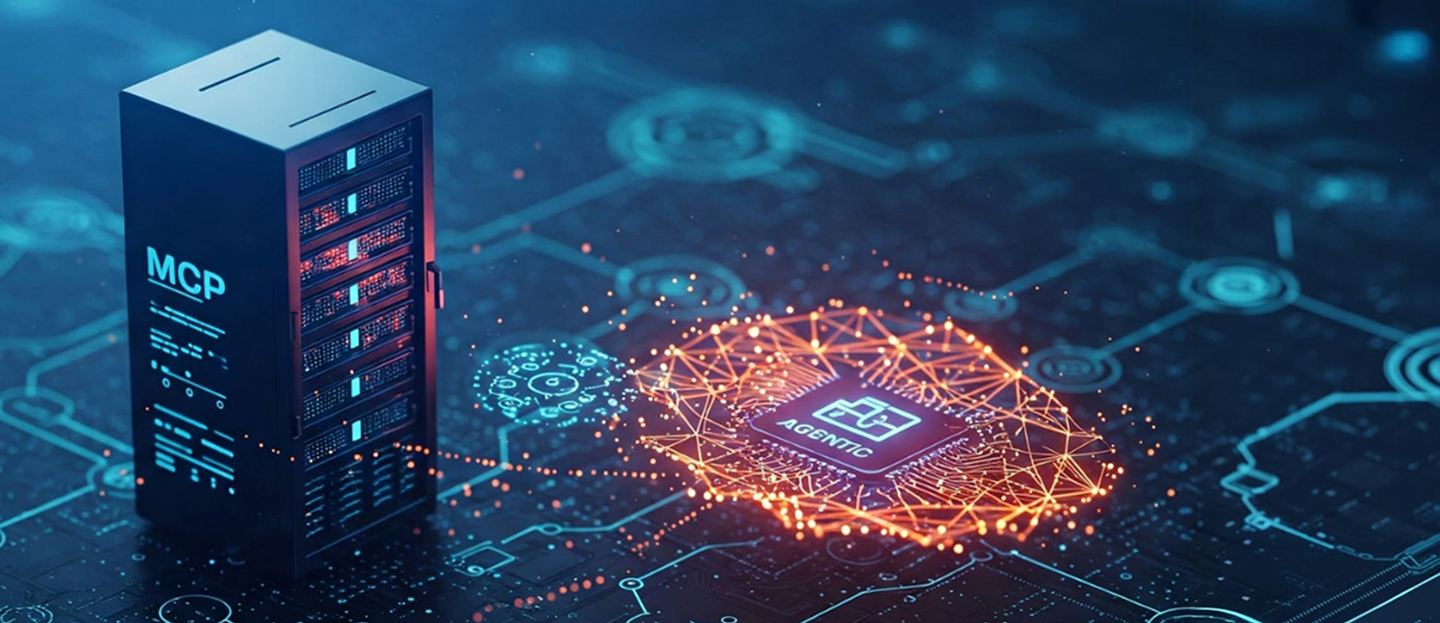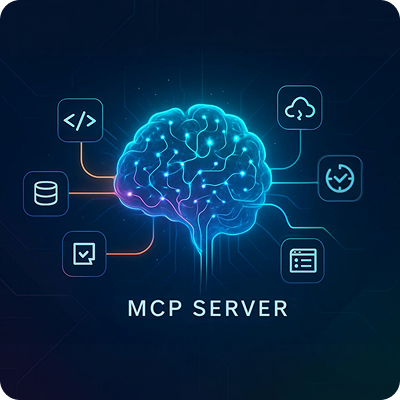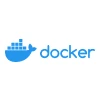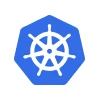
MCP Server Development Company For Operational Efficiency
Design and deploy model context protocol (MCP) services with a team of expert developers to meet business goals.
Book a Free Consultation
Trusted by
Top Companies
MCP server development is a process of designing and implementing model context protocol servers, which allow AI models to link with external tools, APIs, and databases. The development process ensures a seamless integration between large language models and real-time applications. It involves creating endpoints, controlling requests, and handling contextual data exchange.

The unyielding compliance with MCP standards ensures that large language models can communicate with other compatible servers easily.
Model context protocol integration allows developers to implement custom tools to extend the AI capabilities easily without redesigning the core server.
It maintains task-specific context across many requests, allowing LLMs to remember core details for a smooth user experience.
By managing and hosting multiple tools under a single server, MCP allows LLMs to switch and combine functionalities without flaws.
We at Sparkout offer a wide range of MCP server development services to assist with your business needs.
Hold hands with our Model Context Protocol development company to stay updated on the evolving market changes.
From request initiation to response delivery, here’s the detailed guideline on how our MCP server development services make the server work.
The client application triggers a request to the server using HTTP or HCP protocols for data retrieval or command execution.
The MCP server uses security layers to verify the client’s identity, ensuring only the authorized ones can access the resources.
MCP server routes the request to the right service module, ensuring correct logic is applied to initiate the specific task.
The chosen server module executes the request, implements the mandatory operations, and gathers data from databases.
Once executed, the MCP server compiles the output into XML or JSON format, enabling clients to understand and use the data.
Finally, the server delivers the processed response back to the client application, winding up the request-response cycle.
To deploy a successful MCP server, a developer must undergo several layers of planning, testing, and optimization. Here are the different layers that a developer must keep in mind while making an MCP server.
Step-1
Step-2
Step-3
Initially, assess the project goals, use cases, and the tool the MCP server setup needs to link with.
Make sure the server design complies with MCP standards for smooth interoperability with LLM.
Plan the server structure that includes endpoints, communication flow, and security layers.
Step-6
Step-5
Step-4
Add mechanisms for session memory and task continuity, enhancing response accuracy
Link external tools, databases, and APIs to the server, ensuring flawless access to LMS.
Configure development frameworks and infrastructures to build and experiment with the server.
Step-7
Step-8
Step-9
Implement authorisation and authentication measures to safeguard sensitive user data.
Start performance and security tests to ensure reliability and scalability with MCP standards.
Finally, deploy the MCP server and provide continuous monitoring and frequent updates.
From small industries to large enterprises, MCP for AI brings significant advantages to
businesses. These servers understand the
architecture and integrate with AI tools to
ensure the reliability and safety measures before the product deployment.
MCP service development enabled developers to implement AI-powered tools to automate tasks and improve functionality.
These servers provide a centralized platform for businesses to manage the data, requests, and services, providing complete control.
With enhanced authentication and data protection AI protocol, MCP servers ensure secure communication with businesses.
MCP servers are specifically designed to increase scalability, enabling businesses to handle increasing workloads easily.
These servers support custom APIs and modular designs that assist businesses in meeting the project requirements.
Systematic request routing and optimized load balancing ensure quick response times, leading to overall performance improvement.

MCP server development services in the healthcare sector provide secure patient data management and AI-driven diagnostics. These servers follow HIPAA compliance and provide real-time access to patients’ medical records.

Finance and banking sectors take advantage of our MCP development services to provide quick and secure transactions while maintaining compliance. It supports online banking, fraud detection and digital wallets, improving the bank’s transparency.

These servers empower retailers with scalable online platforms for order tracking and shopping. Utilizing analytics integration, e-commerce businesses can gain insights into individual behaviour and drive customer satisfaction.

MCP server integration in telecom companies leverages managing network operations and customer services. With scalable infrastructure, these servers support a wide range of concurrent users with faster connectivity.

Manufacturing industries use MCP servers to control IoT devices, offer predictive maintenance, and automate workflows. By gathering data from various resources, model context protocol servers can detect potential defects.

Being the backbone of the modern digital learning platforms, MCP servers power online classes, learning tools, and digital assessments. Teachers and students can leverage MCP servers for reliable and personalized learning environments.
Our development team at Sparkout creates MCP servers according to the business needs and can manage high workloads to give better output
We at Sparkout use future technologies and frameworks for MCP server development,
enabling your business to stay updated in the current market.



































Yokesh Shankar the technical strategy of the sparkout platform and brand.

Praveen leads innovation and architecture for sparkout platform.

Sivabharathi drives product strategy and technology for sparkout brand.
As a leading AI development company, we at Sparkout ensure your business receives scalable and secure solutions that satisfy the project's needs. Our developers bring expertise in designing architectures which can handle high workloads and speed up the workflow. With their in-depth knowledge, businesses can accelerate digital growth within a short period.
Our MCP server developers will continuously monitor and maintain the systems to ensure reliability and scalability. Overall, they transform complex server operations into streamlined industry operations.

Hire skilled model context protocol server developers from Sparkout to get secure and scalable systems that boost your business.


Top 1000 Companies
Global 2020

Top Custom Software
Development Company

Top Web Developers
2020

Top B2B Companies
United States 2019

Top Software
Development Company

Top outsourcing
companies in USA

Top IT Consulting
Firms in USA
Compared to other firms, we at Sparkout, with technical expertise and dedicated MCP server development services, excel in developing MCP servers that align with the project needs.

Every MCP solution that we build is tailored to your exact workflows and project objectives, bringing accuracy and reducing cost.

Instead of adding after an update, we implement encryption, compliance, and access control from the start, ensuring robust security.

Our MCP servers are built with advanced technologies, which are capable of running smoothly even with heavy workloads.

We bring hands-on experience for different domains, including healthcare, finance, and education, to fit the industry's needs.

From installing the framework to model context protocol implementation, we handle the entire lifecycle with full dedication, achieving the goal.

Upon deployment, we continuously provide proper updates, monitor the behaviour, and provide maintenance service without fail.
Hear the Impact – Straight From Our Clients
From smarter conversations to seamless system automation, our clients have experienced
real transformation. Discover how our services helped them unlock the full power of AI.
Explore our portfolio of custom website development services built to deliver speed, scalability, & business impact.
View case studyFrequently Asked Questions
The main purpose of the MCP server simulation platforms is to validate and optimize server performance before live deployment. This practice reduces potential risks and minimizes the cost.
For MCP developers, the best tools to design and implement the server are GitHub MCP, Docker MCP, MCP Compass, Perplexity MCP, and Figma MCP.
The MCP servers are classified based on the transport mechanism and functionality. Some of the major types include application, simulation, database, web, communication, and cloud-based, each serving different business needs.
MCP for LLM regulates how AI models link with external tools. This allows LLMs to fetch, process, and perform real-time tasks beyond the training data.
The MCP server cost varies depending on various aspects, including the size of the project, type of server, usage, and type of hardware used.
A collection of highly curated blogs on the latest technology and major industry events. Stay up-to-date on topics such as Blockchain, Artificial Intelligence, and much more.
View all blogs